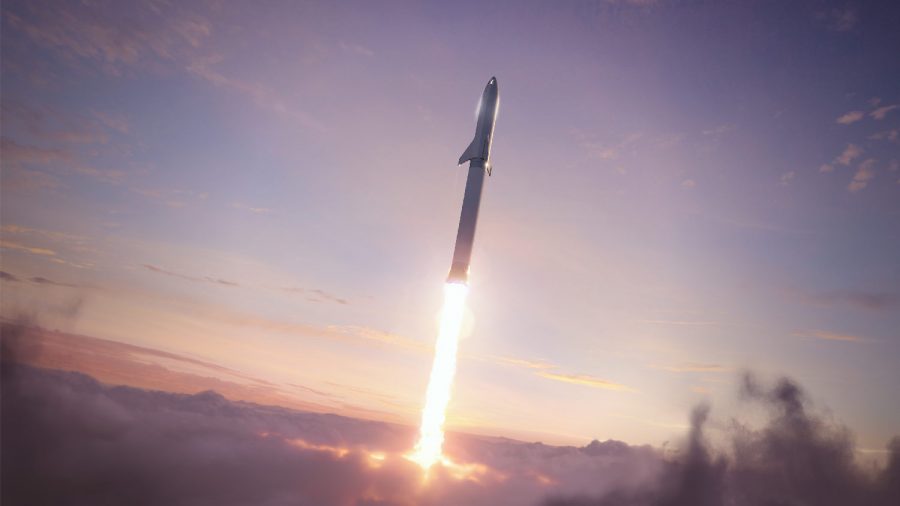PRIVATE CORPORATIONS TO DOMINATE SPACE INDUSTRY
Photo courtesy of spacex.com
A stimulation of SpaceX’s Super Heavy Rocket, 2019.
Each day, Westfield students spend their short breaks between classes stuck in traffic. If at any point they decide to look around, there is a good chance they will see someone wearing a shirt with a NASA logo.
“And I don’t think it’s because they like NASA. It has to be a fashion thing,” declared Andrew Donnelly, science teacher.
But if they knew what is actually going on in the space industry, would they still be enchanted by the old logo that symbolizes dreaming, or would they choose to support something more modern?
Everyone has heard of NASA and SpaceX, but what about Blue Origin? Or Virgin Galactic? Virgin Galactic is a space tourism company that has been in existence since 2004, but have yet to launch anything. During their first test flight in 2014, the spacecraft crashed, killing the pilot. Only last year, they had their first successful launch, which is good news for the 680 clients who already paid $200,000 to take a tour into space.
Blue Origin, owned by Jeff Bezos, on the other hand, “is a big deal,” said Donnelly. “Jeff Bezos doesn’t have government contracts like SpaceX does, which is why he is not moving as quickly. But SpaceX didn’t have the contracts at the beginning either.”
Even now, it is already clear that the two largest areas of space industry are going to be tourism and mining.
Donnelly shares his hopes regarding the growth of the space mining industry: “If companies like SpaceX and Blue Origin can keep bringing the prices down, I can see within 50 years a couple of people being like, ‘I am willing to put money into this because I will be able to get resources that no one on Earth can get and I can do it for cheap.’
“Getting off Earth is the hardest part,” Donnelly affirms, “so if you get a construction yard in space, you can build rockets that take you places, mine stuff cheaply, and then easily bring it back.”
Yet, two space mining start-ups, Deep Space Industries and Planetary Resources, have already failed. Their investors were not willing to put in money and many of them argued that there is no customer base just yet.
“It’s just a matter of time before entrepreneurial people recognize that there are opportunities out there,” remarked Donnelly.
BBC reports there is at least 700 quintillion dollars worth of mineral wealth in the asteroid belt, where everything from iron and nickel to gold and platinum can be found.
Besides being a great business opportunity, space mining can also help the environment, which is a big issue today. People need the rare earth materials to make electronics, a staple of today’s society. By mining them in space, companies can eliminate the harmful effects to Earth’s biosphere.
“That’s the beginning of the real space age. I just hope it happens in my lifetime,” Donnelly wistfully remarked.
So, with all these new companies on the rise, what is happening to NASA?
“NASA was filled with innovative engineers and excited minds 50 years ago. But they’ve grown stagnant, they’ve grown accustomed to minimal but continuous successes in small regions. I have grown up in a world where NASA is just old guys waiting to retire,” sighs Donnelly.
Donnelly is particularly annoyed by the fact that Congress relies on NASA alone to make and send rockets into space. NASA has practically monopolized the market.
“And the amount of money that NASA and our government has wasted on them, billions and billions of dollars, on a program that they know isn’t gonna work, that they know will be replaced by private contractors like SpaceX quickly.” Donnelly brought his fist down on the table repeatedly.
Recently, there is an ongoing competition between SpaceX and Boeing for who is going to get Americans back into space first, which Boeing has been working on since 2012. SpaceX only started on it in 2017, yet is still slightly ahead of Boeing, with their rocket costing times less than that of Boeing.
SpaceX is trying to break this cycle and do things on their own, “which is great, but it is less reliable,” concedes Donnelly. “SpaceX is the way to hedge my bets right now.”
Evan Holloway, 12, from Chantilly High School, who comes to Westfield to take astronomy, disagees: “While SpaceX has proposed some amazing ideas that could revolutionize space exploration, I find that they come of as overzealous at times. There’s only so much money SpaceX can borrow and there are only so many times that they can push back the expected finish date of a project before people get tired of funding and waiting for them.”
According to the New York Times, SpaceX plans to use their new project Starlink, creating a globe-wide satellite internet, to fund their future projects.
Donnelly details how SpaceX got started: “They began with their own money from their own company. In 2015 they competed with Boeing for a contract for putting a couple of satellites up, and they won it, and they got an infusion of money. And once they saw how cheap it was, and how successful it was, there were enough people in the business of deciding where the money should be spent in the government that said ‘Well, some of this money should start going to SpaceX, because they’re doing it for cheaper.’ Now Boeing still gets 2 dollars for every SpaceX’s one. But that won’t last forever.”
Donnelly explains that one of the reasons Boeing, being the fifth largest contractor in the world, gets more contracts than SpaceX is because Boeing can be used as a political tool by Congress: “We’re just gonna keep spending money on a rocket that we are never going to use because we already agreed to purchase it, and because it’s being built in factories so Congressmen can say ‘I added jobs this year.’”
Most of SpaceX’s money comes from doing jobs for the government and private industries. For example, once they launch all the Starlink satellites, any person or company can buy access to this fast internet that can be accessed anywhere in the world.
However, Donnelly voices some concerns about the future of SpaceX: “In my 20s I watched three companies that were like SpaceX get eaten by Boeing and then the programs will be canceled because Boeing is like, ‘Hey, what you are doing sounds really cool, here’s some money and we will pay for you.’ And as soon as they own the company, they shut them down,“ Donnelly snapped his fingers. “This could happen to SpaceX if they have a couple of bad years.”
As NASA struggles to keep up, new companies are gaining momentum. Is the fact that the industry is changing from government based to mostly private companies good for space exploration? On one hand, there is more progress and innovation, but on the other hand businesses focus on getting money, and not so much on exploring space. In the end, for both to happen companies need to collaborate.





